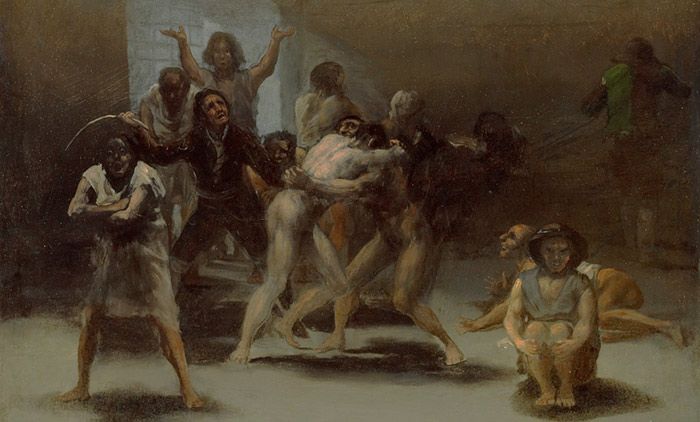by James Barnes

Yard with Lunatics 1794, (detail) by Francisco José de Goya y Lucientes. PHOTO/Wikimedia/Meadows Museum, Dallas
Toward the end of the Renaissance period, a radical epistemological and metaphysical shift overcame the Western psyche. The advances of Nicolaus Copernicus, Galileo Galilei and Francis Bacon posed a serious problem for Christian dogma and its dominion over the natural world. Following Bacon’s arguments, the natural world was now to be understood solely in terms of efficient causes (ie, external effects). Any inherent meaning or purpose to the natural world (ie, its ‘formal’ or ‘final’ causes) was deemed surplus to requirements. Insofar as it could be predicted and controlled in terms of efficient causes, not only was any notion of nature beyond this conception redundant, but God too could be effectively dispensed with.
In the 17th century, René Descartes’s dualism of matter and mind was an ingenious solution to the problem this created. ‘The ideas’ that had hitherto been understood as inhering in nature as ‘God’s thoughts’ were rescued from the advancing army of empirical science and withdrawn into the safety of a separate domain, ‘the mind’. On the one hand, this maintained a dimension proper to God, and on the other, served to ‘make the intellectual world safe for Copernicus and Galileo’, as the American philosopher Richard Rorty put it in Philosophy and the Mirror of Nature (1979). In one fell swoop, God’s substance-divinity was protected, while empirical science was given reign over nature-as-mechanism – something ungodly and therefore free game.
Nature was thereby drained of her inner life, rendered a deaf and blind apparatus of indifferent and value-free law, and humankind was faced with a world of inanimate, meaningless matter, upon which it projected its psyche – its aliveness, meaning and purpose – only in fantasy. It was this disenchanted vision of the world, at the dawn of the industrial revolution that followed, that the Romantics found so revolting, and feverishly revolted against.
The French philosopher Michel Foucault in The Order of Things (1966) termed it a shift in ‘episteme’ (roughly, a system of knowledge). The Western psyche, Foucault argued, had once been typified by ‘resemblance and similitude’. In this episteme, knowledge of the world was derived from participation and analogy (the ‘prose of the world’, as he called it), and the psyche was essentially extroverted and world-involved. But after the bifurcation of mind and nature, an episteme structured around ‘identity and difference’ came to possess the Western psyche. The episteme that now prevailed was, in Rorty’s terms, solely concerned with ‘truth as correspondence’ and ‘knowledge as accuracy of representations’. Psyche, as such, became essentially introverted and untangled from the world.
Foucault argued, however, that this move was not a supersession per se, but rather constituted an ‘othering’ of the prior experiential mode. As a result, its experiential and epistemological dimensions were not only denied validity as an experience, but became the ‘occasion of error’. Irrational experience (ie, experience inaccurately corresponding to the ‘objective’ world) then became a meaningless mistake – and disorder the perpetuation of that mistake. This is where Foucault located the beginning of the modern conception of ‘madness’.
Although Descartes’s dualism did not win the philosophical day, we in the West are still very much the children of the disenchanted bifurcation it ushered in. Our experience remains characterised by the separation of ‘mind’ and ‘nature’ instantiated by Descartes. Its present incarnation? – what we might call the empiricist-materialist position? – ?not only predominates in academia, but in our everyday assumptions about ourselves and the world. This is particularly clear in the case of mental disorder.
Common notions of mental disorder remain only elaborations of ‘error’, conceived of in the language of ‘internal dysfunction’ relative to a mechanistic world devoid of any meaning and influence. These dysfunctions are either to be cured by psychopharmacology, or remedied by therapy meant to lead the patient to rediscover ‘objective truth’ of the world. To conceive of it in this way is not only simplistic, but highly biased.
While it is true that there is value in ‘normalising’ irrational experiences like this, it comes at a great cost. These interventions work (to the extent that they do) by emptying our irrational experiences of their intrinsic value or meaning. In doing so, not only are these experiences cut off from any world-meaning they might harbour, but so too from any agency and responsibility we or those around us have – they are only errors to be corrected.
In the previous episteme, before the bifurcation of mind and nature, irrational experiences were not just ‘error’ – they were speaking a language as meaningful as rational experiences, perhaps even more so. Imbued with the meaning and rhyme of nature herself, they were themselves pregnant with the amelioration of the suffering they brought. Within the world experienced this way, we had a ground, guide and container for our ‘irrationality’, but these crucial psychic presences vanished along with the withdrawal of nature’s inner life and the move to ‘identity and difference’.
Aeon for more